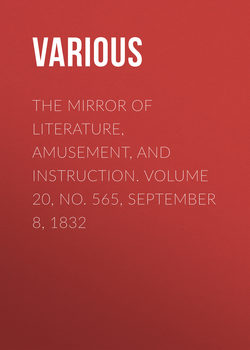Читать книгу The Mirror of Literature, Amusement, and Instruction. Volume 20, No. 565, September 8, 1832 - Various - Страница 4
Spirit of Discovery
ОглавлениеIMPROVED RAW SUGAR
[We find the following information communicated to the Literary Gazette, apparently by the parties connected with the improvement.]
Considerable interest has been excited in the market by the introduction of an improved native raw sugar, which portends very great advantages to all who are engaged in this so long unprofitable branch of colonial and commercial intercourse. It is pure raw sugar, obtained direct from the cane-juice, without any secondary process of decoloration or solution, and by which all necessity for any subsequent process of refining is entirely obviated. It is obtained in perfectly pure, transparent, granular crystals, being entirely free from any portion of uncrystallisable sugar or colouring matter, and is prepared by the improved process of effecting the last stages of concentration in vacuum, and at a temperature insufficient to produce any changes in its chemical composition; the mode of operation first proposed by the late Hon. Ed. Charles Howard, and subsequently introduced, with the most important advantages and complete success, into the principal sugar-refineries of Great Britain.
By this improved and scientific process of manufacture, the application of which to the purpose of preparing raw sugar from the cane-juice has now first been proposed, the most singular advantages are secured to the planter, in an increased quantity of sugar, the product of his operation, and in saving from the immense quantity of deteriorated material, uncrystallisable sugar and molasses, which were products of the former mode of operation, from the intense and long-continued degree of heat employed in the processes. The time and labour of the operation are also greatly decreased; the apparatus possesses the power to make double the quantity in the same space of time as the old method, and this is ready for shipment in four days, in lieu of three weaks, as heretofore. The sugar likewise readily commands an advanced price in the market to the planter of ten or twelve shillings per cwt.
This improved sugar readily ensures a preference for all purposes of manufacture, solution, or domestic economy. It is a purer sweet, and of a richer mellifluous taste than even the best refined; it is not apt to become ascescent in solution; and, from its superior quality, it well answers all purposes of the table. In the manufacture of rum from the molasses, which are separated during the first process of the operation, there is no danger of deterioration in the production of empyreuma, and a far purer spirit is obtained than that made from ordinary molasses.
This improved process is now in complete and successful operation on eight estates in Demerara. The general introduction of the process is considered by the best practical judges to ensure certain means of revivifying the spoiled fortunes of the planters, and to open a new era in the prosperity of those portions of the British crown, of which this forms the principal staple commodity of support.
[According to Dr. Moseley, the art of refining sugar, and what is called loaf sugar, is a modern European invention, the discovery of a Venetian, about the end of the fifteenth or beginning of the sixteenth century. Sugar candy is of much earlier date, for in Marin's Storia del Commercio de Veneziani, there is an account of a shipment made at Venice for England in 1319, of 100,000 lbs. of sugar, and 10,000 lbs. of sugar candy. Refined, or loaf sugar is mentioned in a roll of provisions in the reign of Henry VIII.
The process of refining sugar in vacuo is the most useful application of "the fact that liquids are driven off, or made to boil at lower degrees of heat when the atmospheric pressure is lessened or removed."3 The first part of the process is to dissolve impure sugar in water, and after clarifying the solution, to boil off or evaporate the water again, that the dry crystallized mass may remain. Formerly this evaporation was performed under the atmospheric pressure, and a heat of 218° or 220° was required to make the syrup boil; by which degree of heat, however, a portion of the sugar was discoloured and spoiled, and the whole produce was deteriorated. The valuable thought occurred to Mr. Howard, that the water might be dissipated by boiling the syrup in a vacuum or place from which air was excluded, and therefore at a low temperature. This was done accordingly; and the saving of sugar and the improvement of quality were such as to make the patent right, which secured the emoluments of the process to him and other parties, worth many thousand pounds a-year. The syrup, during this process, is not more heated than it would be in a vessel merely exposed to a summer sun.
3
Arnott's Elements of Physics.
